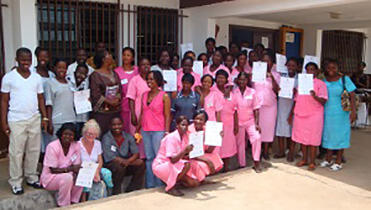
Two Liverpool-based members of staff from LSTM’s Centre for Maternal and Newborn Health (CMNH) have just got back from a visit to Sierra Leone.
Fred Yeomans, Programme Manager, met with officials from the Ministry of Health and Sanitation (MOHS) to assist in planning the nationwide roll-out and financial arrangements for the UNICEF funded In-Service Capacity Building Project. Under this project, CMNH provides technical support to MOHS to plan and implement national in-service capacity -building and training of health workers.
The 7 key Reproductive and Child Health modules as identified by the MOHS are antenatal care (ANC), postnatal care (PNC), adolescent sexual and reproductive health services (ARH), gender based violence (GBV), integrating nutrition and HIV/AIDS high impact interventions.
These modules have been updated and standardised to ensure high educational standards by CMNH, and each module will be delivered over 2 day periods nationwide between by the end of December 2014.
Fred also met with UNICEF to update on progress on the Making it Happen project (also funded in part by the department for International Development DFID), which has been running in-country since 2010 and is now in its third phase of delivery.
Whilst in Freetown, Fred worked with the three members of the LSTM Sierra Leone team and CMNH’s partner in-country, Health Poverty Action, to review progress against objectives and address any issues. He said: “The team in Freetown are extremely busy with two large programmes to deliver and it’s great to see how successful they have been, often battling against some difficult infrastructure issues. We are aware of the terrain there but it’s always helpful to meet with colleagues, partners and funders in the flesh and see things first hand.”
Sue Jones, Research Associate, was also in Freetown to teach on the Maternal and Child Health (MCH) Aides Emergency Obstetric Care and Newborn Care course, and to liaise with MOHS and UNICEF. She has much experience of working in the country and leads on the MCH Aides programme, which is a national cadre of nursing staff providing care at the community level. It was introduced by MOHS to address a lack of skilled birth attendants for well over 50% of women, which is cited as one of the reasons for the high maternal and infant mortality rates in the country.
Students undertake a two year training programme and MCHAs currently provide over 70% of all services in peripheral health units and constitute 46% of the total healthcare work force. The goal of the MCHA training is to improve the quantity and quality of human resource for health in peripheral health units thereby increasing access to quality MCH services contributing to the achievement of MDGs 4 and 5 in Sierra Leone.
The project started in January 2013 and is due for completion in December 2014. Ninety tutors had been trained by January 2014 and the remaining tutors will undergo training in the first quarter of this year.